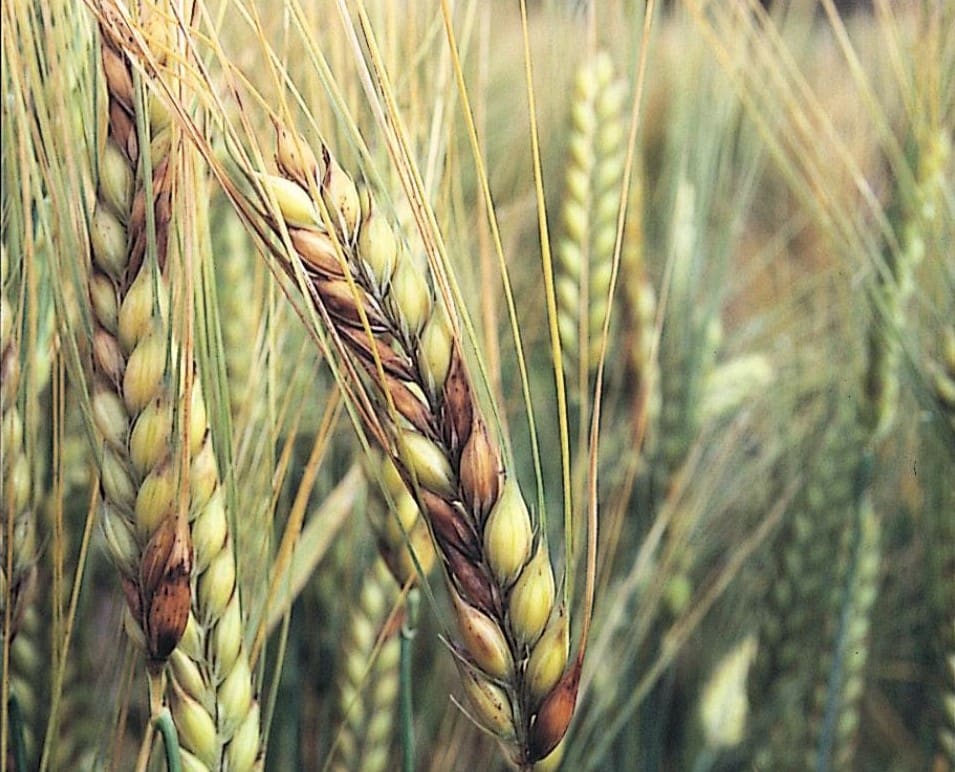
The F. graminearum fungus causes the disease fusarium head blight in cereal crops and corn. Photo: GRDC
UNITED STATES authorities have charged two Chinese nationals with allegedly trying to smuggle Fusarium graminearum, the cause of the fungal fusarium head blight disease, into the country.
The pathogen is already present in the US and in countries around the world, where it affects wheat, barley, corn, and rice, inflicting billions of dollars in economic losses.
It also produces toxins that can cause vomiting, liver damage, and reproductive defects in humans and livestock.
Major outbreaks of F. graminearum are rare in Australia’s grains industry, but the 2022 season saw high pathogen loads trigger severe yield losses in some paddocks.
The incident serves as a timely reminder of the critical importance of Australia’s biosecurity system, and the need to adhere to protocols when importing potentially harmful pathogens and organic material.
In a statement released on June 3, US Attorney for the Eastern District of Michigan, Jerome F Gorgon Jr, said Yunqing Jian and Zunyong Liu were charged with conspiracy, smuggling goods into the US, false statements, and visa fraud.
Ms Jian, who was arrested by the Federal Bureau of Investigations and is currently in custody, is reportedly a postdoctoral research fellow at the Molecular Plant-Microbe Interaction Laboratory at the University of Michigan.
Mr Liu, a researcher at Zhejiang University in China, was not in the US when the charges were laid.
It has been stated that Ms Jian had received Chinese Government funding for her research into the pathogen in China.
It was further alleged Mr Liu also conducts research on the same pathogen in China, and that he first lied but then admitted to smuggling Fusarium graminearum into the US through Detroit Metro Airport so he could conduct laboratory research on it at the University of Michigan.
“The alleged actions of these Chinese nationals — including a loyal member of the Chinese Communist Party — are of the gravest national security concerns,” Attorney General Gorgon said.
“These two aliens have been charged with smuggling a fungus that has been described as a ‘potential agroterrorism weapon’ into the heartland of America, where they apparently intended to use a University of Michigan laboratory to further their scheme.”
US Customs and Border Protection director of field operations Marty C Raybon said the charges laid against the researchers demonstrated the critical role the organisation plays “in protecting the American people from biological threats that could devastate our agricultural economy and cause harm to humans”.
In a statement, the University of Michigan said they “strongly condemn any actions that seek to cause harm, threaten national security or undermine the university’s critical public mission”.
“It is important to note that the university has received no funding from the Chinese Government in relation to research conducted by the accused individuals,” the statement said.
“We have and will continue to cooperate with federal law enforcement in its ongoing investigation and prosecution.”
When asked about the charges during a regularly scheduled press conference on June 4, China’s Foreign Ministry spokesperson Lin Jian said he was not familiar with details of the case but that all nationals studying or working overseas should observe the rules of that country.
“The Chinese Government always asks Chinese nationals overseas to strictly observe local laws and regulations, and protects their legitimate and lawful rights and interests in accordance with the law,” Mr Jian said.
Fusarium impacts
Graminearum is one species of the fusarium pathogen to cause fusarium head blight, and is the most prevalent in the US.
It is known to produce mycotoxins which makes infected grain or plants unacceptable to include in human food or livestock feed.
The disease is more prevalent in seasons with prolonged high humidity and wet weather during flowering and grain fill.
The fungus has the potential to cause yield losses of 20-100 percent, significant quality downgrades, and marketing issues, with contamination levels above 1pc enough to see grain rejected under Grain Trade Australia standards.
In the US, where F. graminearum is relatively common, industry has an early warning system which monitors biomarkers to alert growers in advance of an outbreak and allow for timely application of fungicides.
Protocols in place in Australia
Australia’s Department of Agriculture, Fisheries and Forestry oversees strict biosecurity laws for the import of organic material for research or other uses.
The system requires import permits to be obtained through the Biosecurity Import Conditions System, as well as arranging an approved high-containment laboratory to handle and receive the material.
Announcing the endorsement of the National Biosecurity Strategy Action Plan late last year, Minister for Agriculture, Fisheries and Forestry Julie Collins said it was vital that everyone participates to help “ensure Australians continue to benefit from our strong biosecurity”.
“As a shared responsibility, biosecurity is key to our productive agricultural, fisheries and forestry sectors,” Ms Collins said.
“It underpins our global two-way trade and is essential to protecting our unique natural environment and the way of life all Australians enjoy.”
Grain Central: Get our free news straight to your inbox – Click here

HAVE YOUR SAY